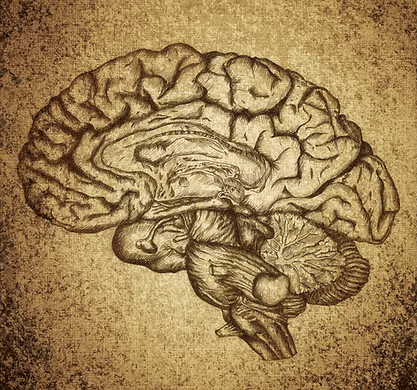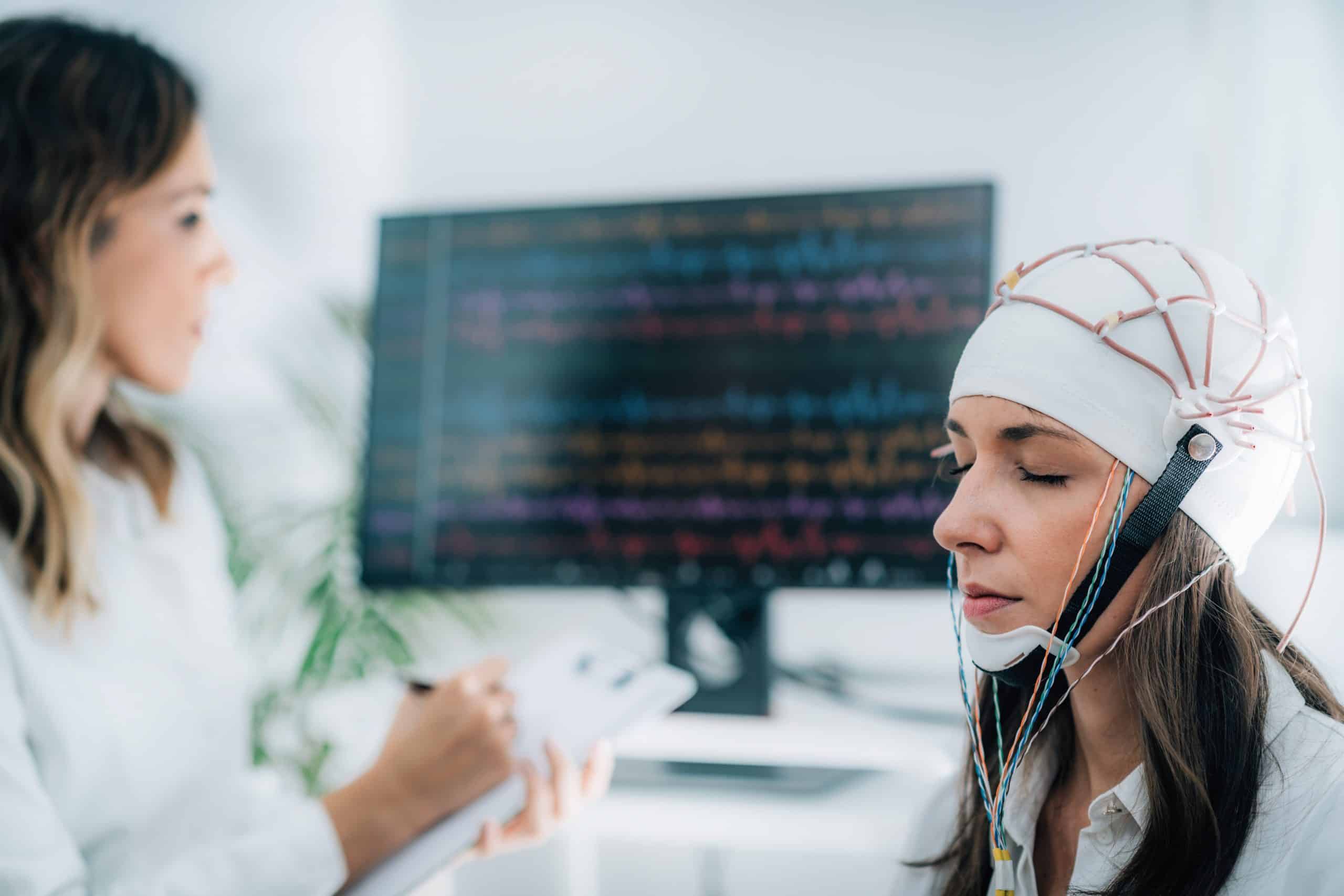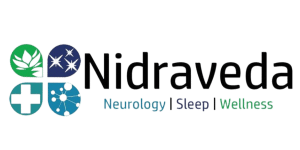Copyright © 2024 Nidraveda, All rights reserved. Powered by Infinisolve.
- 4358 Lockhill Selma Rd, Suite 106, Shavano Park, TX 78249
- Tel: 210.686.5000
- Fax: 210.239.5060
Areas of Neurology

FAQ
- Epilepsy is a neurological condition where a person experiences recurrent, unprovoked seizures due to abnormal electrical activity in the brain. Seizures can vary in type and severity, affecting individuals differently.
- Common symptoms include sudden, uncontrollable movements, loss of consciousness, and sensory disturbances. Symptoms can vary depending on the type of seizure experienced.
- Diagnosis involves a detailed medical history, neurological examination, and tests such as electroencephalograms (EEGs) and brain imaging to identify abnormal brain activity and determine the type of epilepsy.
- Treatment options may include antiepileptic drugs (AEDs), lifestyle adjustments, and, in some cases, surgical interventions. Our approach is personalized based on the patient’s specific condition and needs.
- While there is no definitive cure for epilepsy, many individuals can achieve significant seizure control with appropriate treatment. Our goal is to manage symptoms effectively and enhance quality of life.
- Management strategies include adhering to prescribed treatments, maintaining a consistent routine, identifying and avoiding seizure triggers, and seeking regular follow-up care with your healthcare provider.
Epilepsy
Epilepsy is a neurological disorder characterized by recurrent seizures caused by abnormal electrical activity in the brain. At Nidraveda, we provide comprehensive care for individuals with epilepsy, utilizing advanced diagnostic tools and personalized treatment plans to manage and reduce seizure frequency, improve quality of life, and support overall neurological health.
Our Approach:
- Diagnosis: We perform a thorough assessment including medical history, neurological examination, and advanced diagnostic tests to accurately diagnose epilepsy and determine its type and cause.
- Treatment: Our treatment options include medications, lifestyle modifications, and, in some cases, surgical interventions. We tailor our approach to each patient’s unique needs, aiming to control seizures and minimize side effects.
- Support: We offer ongoing support and education to help patients and their families understand and manage epilepsy, including strategies for seizure control and coping mechanisms.
Benefits of Our Care:
- Personalized Treatment Plans: Customized to effectively address your specific type of epilepsy and individual health needs.
- Comprehensive Diagnostics: Utilizing advanced technology to ensure accurate diagnosis and monitoring.
- Supportive Care: Providing education and resources to help you manage epilepsy confidently and improve your quality of life.

FAQ
An Electroencephalogram (EEG) is a test that records electrical activity in the brain using electrodes placed on the scalp. It helps in diagnosing and monitoring neurological conditions.
An EEG measures the electrical impulses in the brain, known as brain waves. It detects abnormalities in brain activity that may indicate neurological disorders.
No, the EEG procedure is completely painless. Electrodes are placed on the scalp with a conductive gel, and the test involves no discomfort.
Types of EEG
1. Routine EEG:
- Purpose: A Routine EEG is used to evaluate brain activity at a specific point in time, often to diagnose conditions like epilepsy, sleep disorders, or other neurological issues.
- Procedure: The test involves placing electrodes on the scalp to record electrical activity for approximately 20 to 60 minutes while the patient is awake or asleep. It typically includes various stimuli, such as flashing lights or deep breathing, to provoke brain responses.
- Usage: It’s commonly used in outpatient settings to provide a snapshot of brain function and help in diagnosing acute or chronic conditions.
2. Long-Term EEG:
- Purpose: A Long-Term EEG, also known as a prolonged or continuous EEG, is used for more comprehensive monitoring over an extended period, ranging from 24 hours to several days. It helps to capture brain activity during normal daily activities and sleep cycles.
- Procedure: Electrodes are placed on the scalp, similar to a Routine EEG, but the patient wears a portable EEG device for the duration of the monitoring period. This allows for continuous recording of brain activity and can include video monitoring to correlate EEG findings with behavior.
- Usage: It’s used to diagnose complex cases, monitor epilepsy over time, or assess the effects of treatment, especially when seizures or symptoms occur infrequently.
Both types of EEG are crucial for diagnosing and managing neurological conditions, with Routine EEG providing a snapshot and Long-Term EEG offering an extended view of brain function.
It is generally recommended to avoid caffeine and hair products on the day of the test. You may be asked to follow specific instructions based on your individual situation.
After the EEG, our neurologists will analyze the results and schedule a follow-up consultation to discuss the findings and recommend any necessary treatment or further tests.
Electroencephalogram (EEG)
An Electroencephalogram (EEG) is a diagnostic test that measures electrical activity in the brain. At Nidraveda, we use EEGs to diagnose and monitor various neurological conditions, including epilepsy, sleep disorders, and brain injuries. The EEG provides valuable insights into brain function and helps guide treatment decisions.
Our Approach:
- Procedure: The EEG involves placing small electrodes on the scalp to record electrical activity. This non-invasive test is painless and typically takes 20-60 minutes.
- Analysis: We analyze the recorded brain waves to identify abnormal patterns that may indicate neurological conditions. The results help in diagnosing conditions and monitoring treatment progress.
- Consultation: Following the EEG, we provide a detailed explanation of the results and discuss appropriate treatment options based on the findings.
Benefits of EEG:
- Accurate Diagnosis: Provides detailed information about brain activity, aiding in the accurate diagnosis of neurological conditions.
- Non-Invasive: The procedure is safe, painless, and does not require any incisions or injections.
- Treatment Guidance: Helps in assessing treatment efficacy and making necessary adjustments for optimal patient care.
Brain Health & Cognitive Testing
At Nidraveda, we prioritize your brain health with comprehensive cognitive testing and evaluations designed to detect early signs of cognitive impairment and other neurological conditions. By using cutting-edge techniques, we provide insights into your brain’s performance, helping you take proactive steps toward preserving cognitive function.
For a more detailed look into our brain health solutions, including innovative therapies like IV Infusion and PRP for migraines, visit our MindLab section. Empower your mind with personalized care and advanced treatments.
Other Areas of Neurology

Multiple Sclerosis? Stroke? Tremor? Peripheral Polyneuropathy?
At Nidraveda, we strive to be the best at what we do. We take care of a whole host of neurological conditions, from multiple sclerosis, to tremors, to movement disorders such as Parkinson’s disease, to strokes. We also treat peripheral neurological conditions and ADHD.
We utilize a comprehensive approach to all aspects of care from diagnosis to treatment. Neurological conditions tend to be complicated and using this approach allows us to better understand your condition.
So whether you have numbness, weakness, fatigue, double vision, or anything else neurological, we aim to help you get evaluated, diagnosed, and treated. Book an appointment with us today to see and feel the difference!
Schedule online. It's easy, fast and secure.
Visit Us
-
4358 Lockhill Selma Road, Suite 106,
Shavano Park, TX 78249 - contact@nidraveda.com
- 210.686.5000
Quick Links
Menu
Business Hours
M – Th: 9am – Noon & 1pm – 5pm
F – 8am – Noon & 1pm – 5pm
Lunch: Noon – 1pm
Saturday: Closed
Sunday: Closed
